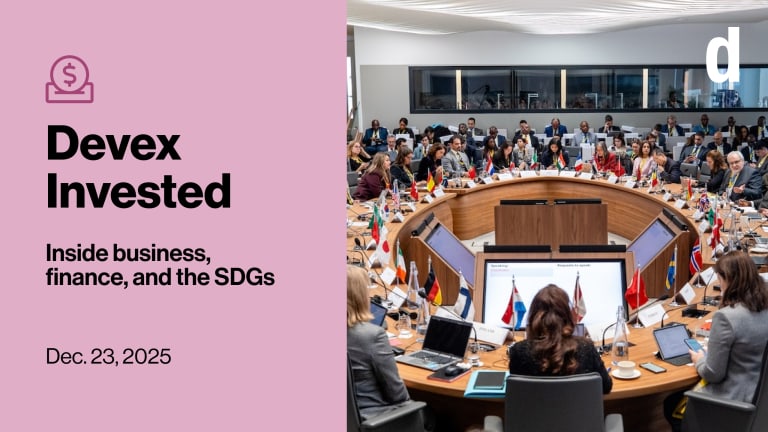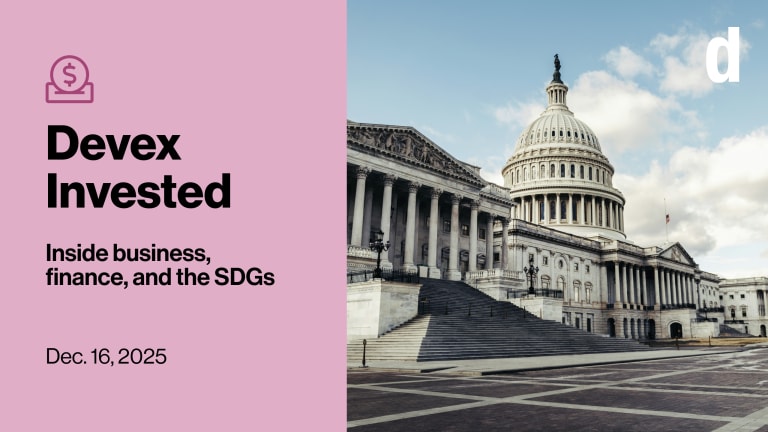
Irrespective of your enthusiasm for that “new bank smell,” there is an important opportunity that those setting up the U.S. International Development Finance Corporation should not fail to embrace.
Its architects have a chance to fast-forward through the period when the World Bank, International Finance Corporation, African Development Bank, Asian Development Bank, and many others had nothing in place to avoid exacerbating conditions in fragile and conflict-affected countries, let alone promote stability. This resulted in damage to their reputations and their investments.
More on the U.S. Development Finance Corporation:
► How policy wonks, politicos, and a conservative Republican remade US aid
► Support for new US development finance bill, even as some details are questioned
The early adoption of an investment framework that effectively manages such conflict risk will put the USDFC at the head of the pack. What’s more, we know that investment, properly adapted, can not only avoid exacerbating pre-existing conflict, but can actually help tackle the reasons violence occurs. For example, that can happen through conflict-smart employment and procurement practices and the way the relationship between government, the investor, and communities is managed.
This is especially important in markets such as Nigeria, Colombia, and Pakistan, which the USDFC will no doubt seek to include among its portfolio of investments. These are growing economies but with significant and persistent levels of conflict that stunt growth and investment in many regions.
Investment in conflict contexts was not alien to USDFC’s predecessor, the Overseas Private Investment Corporation. In 2014 it developed an “approach” for “Projects in Fragile Governance Environments.” There is a difference, however, between having an “approach” and embedding practice in key institutional frameworks and processes, from deciding to finance a project to supporting clients in effectively designing and monitoring implementation — ensuring that conflict risk is appropriately mitigated and capitalizing on opportunities to enhance stability. Integration into risk management and oversight mechanisms will be key. OPIC’s approach also centered around state governance, which is important, but is not always the primary factor contributing to conflict in an investment area.
Who says this is a priority? Well, the U.N. and World Bank for a start. They released a joint report in 2018 called Pathways for Peace. It argued there is no linear relationship between growth, investment, and peace and stability unless development finance is deliberately designed and adapted for it. This is a pretty important lesson for those who are already trumpeting the USDFC as innately good for U.S. national security.
The U.S. Congress, it seems, is also on the case. The Global Fragility and Violence Reduction Act is currently working its way through the arteries of the legislature, spearheaded by a bipartisan group of representatives and senators, including some who supported the legislation to establish the USDFC. The act aims to reshape how the U.S. seeks to prevent conflict and reduce violence, including through how it uses its aid. It will require U.S. agencies to shape their assistance to ensure it promotes economic development but also enhances stability.
Institutional views aside, it also makes business sense. “A good deal” for America in this case is development finance that reinforces peace and stability, leading to more stable emerging markets, increased investment opportunities, higher rates of return and, for companies, lower business risk insurance and guarantees.
Consider Nigeria. By 2050, some estimate it will host the third-biggest population in the world after India and China. But many areas of the country remain racked by instability, keeping incomes low and infrastructure weak and disincentivizing investment.
A bad deal for America is financing investments that are unsustainable because they make the conflict worse rather than better. This is not only business-dumb but also threatens U.S. national security interests at home and overseas.
Conflict-smart finance will buy an edge over competitors. Being able to offer clients better risk management when it comes to working in less stable states could put the USDFC ahead of rivals such as the U.K.’s CDC, the International Finance Corporation and, perhaps most importantly for the U.S., the China-based Asian Infrastructure Investment Bank. All have been grappling with the issue of investment in fragile contexts, but none of them are yet to fully institutionalize or operationalize the necessary systems across their portfolios.
The good news is that there are both policy and operational business-friendly frameworks already available to pick up and apply. One includes a business tool on conflict-sensitive business practice, developed by International Alert in conjunction with companies such as Anglo America. Instead of setting up parallel systems, it builds on existing due diligence frameworks that business already applies and comes recommended by OPIC’s Office of Accountability.
There are also lessons learned from others’ experience, especially the World Bank, which is incrementally changing its own practices following demands from its shareholders for an increased focus on fragile states. International Alert’s report — “Fragile reforms” — provides one insight into the challenges the bank is attempting to tackle. International standards such as the Voluntary Principles on Human Rights and Security also offer important guidance for astute investors.
So whether you care about poverty, return on investment, or national security, when it comes to the USDFC, conflict-smart investment ticks your box.








